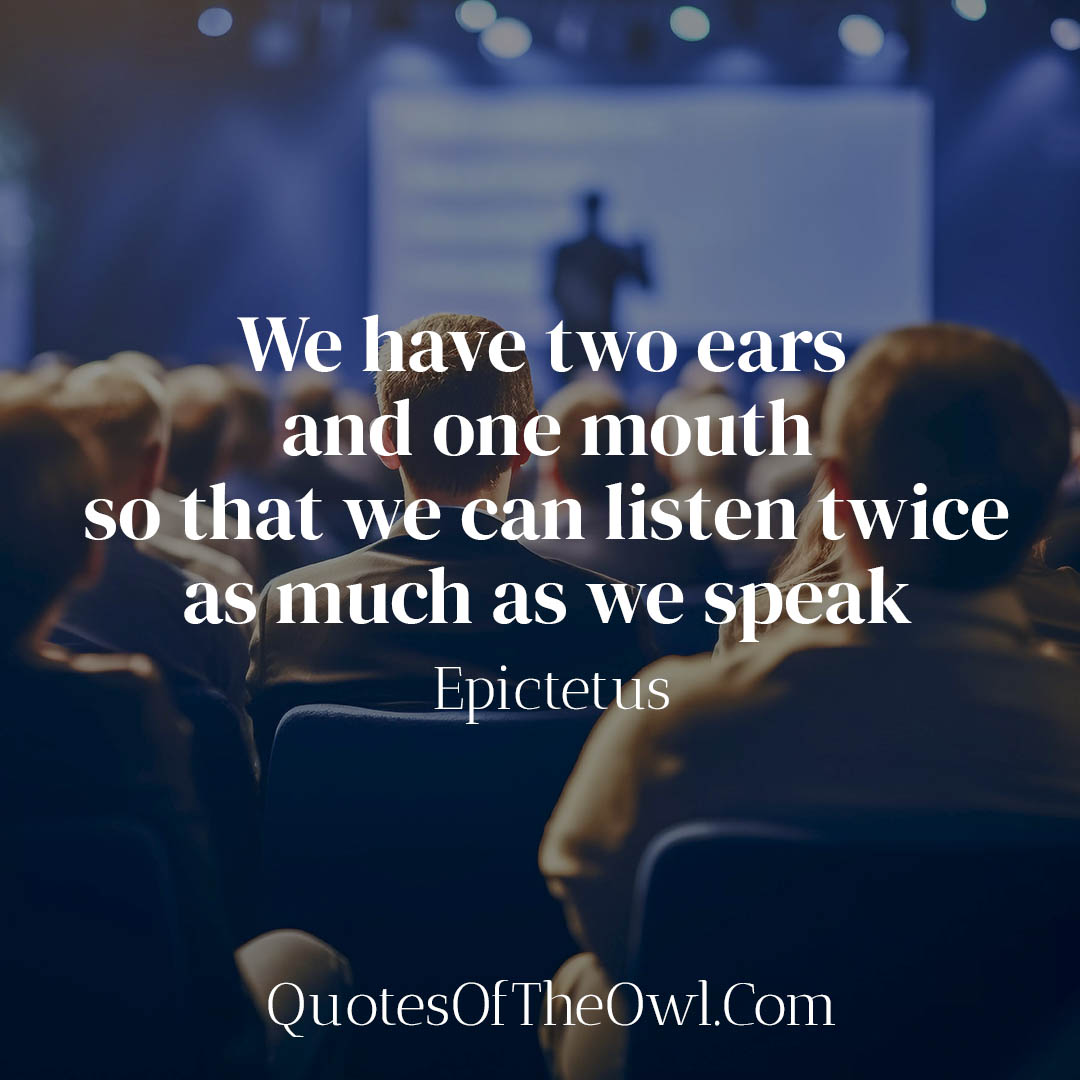We have two ears and one mouth so that we can listen twice as much as we speak – Epictetus
In the realm of ancient philosophy, Epictetus, a Greek Stoic philosopher, left behind profound wisdom that continues to resonate in modern times. One of his timeless quotes states, “We have two ears and one mouth so that we can listen twice as much as we speak.” This article delves into the depth of this quote, exploring its significance, implications, and practical applications in our daily lives.
Epictetus, born a slave in Hierapolis, Phrygia, around 55 CE, rose to become one of the most influential Stoic philosophers. Despite his humble origins, his teachings on ethics, resilience, and personal freedom have transcended centuries. The quote in question encapsulates a fundamental principle of effective communication and interpersonal relationships.
Understanding the Significance
Interpretation of the Quote
At its core, Epictetus’ quote urges individuals to prioritize listening over speaking. It underscores the importance of attentive and empathetic listening as a cornerstone of meaningful communication.
Listening vs. Speaking: Importance in Communication
In any interaction, be it personal or professional, effective communication is paramount. While speaking allows us to express ourselves, listening facilitates understanding, connection, and collaboration. By listening intently, we gain insights into others’ perspectives, fostering empathy and mutual respect.
The Art of Listening
Active Listening Techniques
Active listening goes beyond hearing words; it involves fully comprehending the speaker’s message, both verbal and non-verbal. Techniques such as paraphrasing, summarizing, and asking clarifying questions demonstrate genuine engagement and foster rapport.
Empathy and Understanding
Empathy, the ability to understand and share others’ feelings, is intricately linked to active listening. By putting ourselves in others’ shoes and suspending judgment, we create a supportive environment conducive to open communication and problem-solving.
Benefits of Listening
Building Stronger Relationships
Effective listening strengthens interpersonal bonds by validating others’ experiences and fostering trust. It cultivates a sense of belonging and appreciation, laying the groundwork for meaningful connections and collaborative endeavors.
Enhancing Learning and Growth
In the pursuit of knowledge and personal development, listening serves as a gateway to new insights and perspectives. By embracing diverse viewpoints and remaining open-minded, we broaden our horizons and continuously evolve.
The Power of Silence
Silence as a Form of Communication
In certain situations, silence can convey more profound meanings than words. By practicing reflective silence, we allow space for introspection, contemplation, and deeper understanding.
Reflective Listening
Reflective listening involves mirroring others’ emotions and thoughts, acknowledging their experiences without imposing judgment or advice. It fosters mutual respect and emotional validation, nurturing meaningful connections.
Overcoming Barriers to Listening
Distractions and Prejudices
In today’s fast-paced world, distractions abound, hindering our ability to listen attentively. Additionally, biases and prejudices can cloud our judgment, impeding genuine communication. Overcoming these barriers requires mindfulness and self-awareness.
Cultivating Mindfulness
Mindfulness, the practice of being present in the moment without judgment, is instrumental in improving listening skills. By cultivating mindfulness through meditation and self-reflection, we sharpen our focus and deepen our connections with others.
Balancing Listening and Speaking
When to Listen and When to Speak
Effective communication entails striking a balance between listening and speaking. While listening fosters understanding and empathy, speaking allows us to assert ourselves, share our perspectives, and contribute to conversations meaningfully.
Effective Communication Practices
Practices such as active listening, empathy, and assertiveness enable us to navigate various communication scenarios with confidence and grace. By honing these skills, we foster harmonious relationships and drive positive change.
Applying Epictetus’ Quote in Daily Life
Personal Reflection and Action Steps
Reflecting on Epictetus’ quote prompts introspection and self-assessment. We can evaluate our listening habits, identify areas for improvement, and commit to practicing active listening in our interactions.
Improving Communication Skills
By incorporating active listening techniques and fostering empathy in our communication, we enhance the quality of our relationships and contribute to a more inclusive and empathetic society.
Conclusion
In conclusion, Epictetus’ timeless wisdom reminds us of the transformative power of listening in fostering understanding, empathy, and connection. By embracing the art of listening and balancing it with speaking, we enrich our relationships, enhance our communication skills, and cultivate a more harmonious world.

